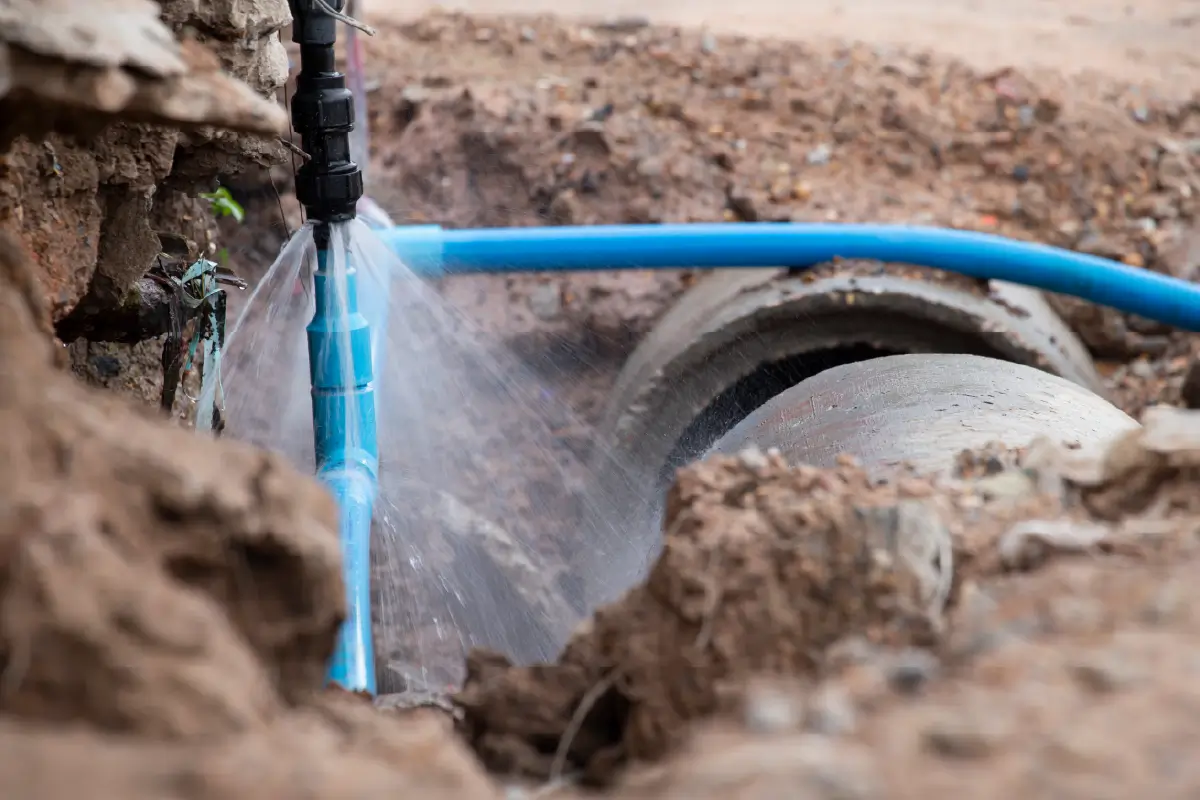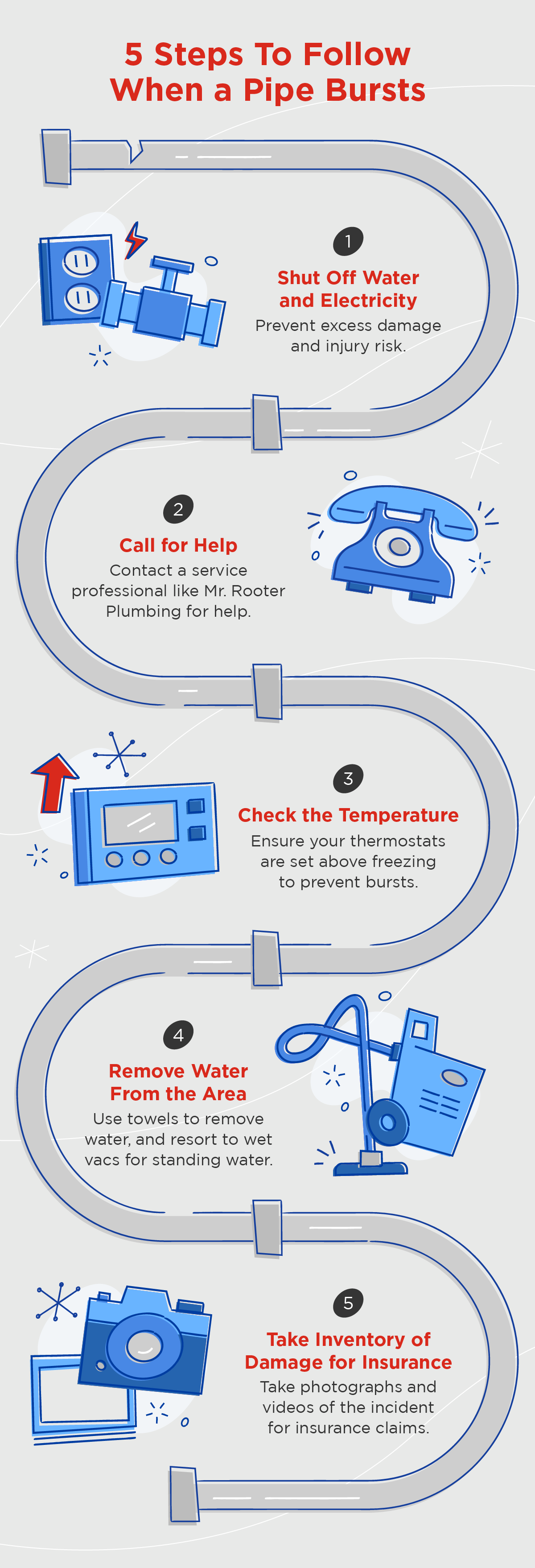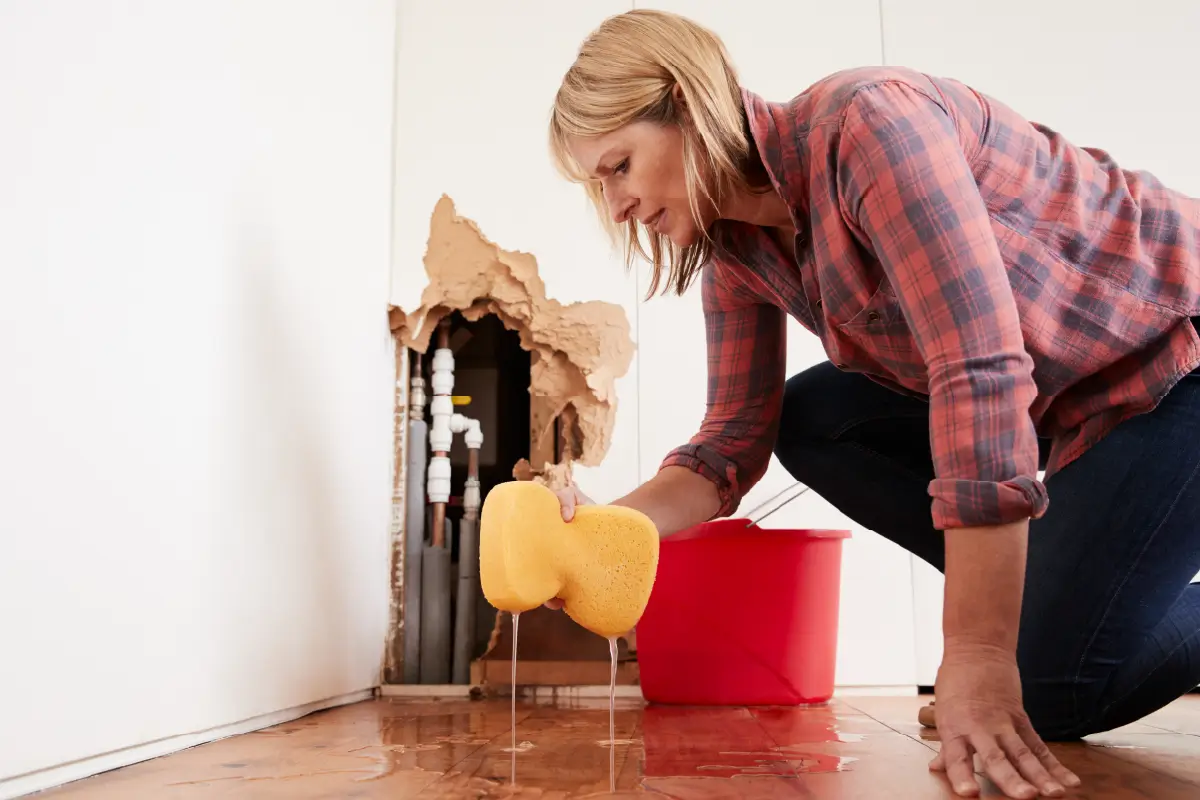
Water leaking in your home, sudden water pressure issues, and stains on your walls can all be signs of a burst pipe. But don't panic; taking quick, careful steps is the key to preventing further damage to your property.
We'll go over what causes a broken pipe and walk you through the steps to protect your home from further damage and yourself from potential injury. If you have a plumbing emergency, contact a local plumber like Mr. Rooter Plumbing® to address the issue.
1. Immediately Shut Off Water and Electricity
If you have a burst pipe, your first step should be to shut off your water immediately to prevent any additional damage to your home. You'll need to locate your water shut-off valve, typically found in your basement or crawlspace; you may also find it near your water heater tank. If the broken pipe is visible, this is a good time to note its location for when your plumber arrives.
Once you shut off your water, consider turning off your electricity. Water and electric currents don't mix and can cause serious risks. Using your home's electrical panel, shut off circuits near the busted water pipe. If you are unsure how your home's circuits are laid out, the safest option may be to shut off electricity to the entire house.
2. Locate Burst Pipe Repair Services Near You
Once you’ve shut off the water to your burst pipe and your home's electricity isn't posing any risks, it's time to call in a plumber. If you can’t shut off your water, time becomes even more critical, and you should call an emergency plumbing service before excessive damage occurs.
We recommend calling the Mr. Rooter Plumbing team to fix your burst pipe. Here's why: We've been doing quality work since 1970, we have dedicated teams nationwide that offer upfront pricing, and we're licensed professionals you can trust for unparalleled service — even in an emergency.
3. Check the Temperature Level in Your Home
Excellent — a plumber is on the way, or you've scheduled a service appointment; now what? Ensure the temperature level in your home is adequate. One of the most common causes of a pipe burst is frozen water that applies internal pressure, causing the conduit to break.
If you don't address low temperature levels before continuing, you could quickly become a victim of another pipe bursting. If your pipe bursts in a non-temperature-controlled area of your home, such as a garage or crawlspace, consider adding heating or insulation to prevent future ruptures.
4. Begin Removing Water From the Area
Once you have shut off the water leading to your broken pipe and handled any potential electrical hazards, you can begin removing standing water. If you believe sewage may be present, wait for the plumber to address the issue — it isn’t worth risking your health.
Begin by collecting water with towels and mops. If the pipe burst has caused a large amount of water to enter your home, you may need a wet/dry shop vacuum or a pump. To prevent mold growth, open your windows and run a dehumidifier to help dry surfaces and remove moisture from the air.
5. Take Inventory of Damage for Insurance
Unfortunately, one of the realities of a pipe burst is that it can cause extensive damage. You'll need to contact your homeowners or renters insurance provider to understand what's covered, but you can begin the documentation process immediately.
Take clear photographs of the damage; videos can be extra helpful in some situations, so record a walk-through of your house. Create a detailed list of damaged items, noting the brand and model (if applicable) and their condition. When you file your claim, you'll need to determine the replacement cost of each item.

7 Signs You Have a Burst Water Pipe
Burst pipes don't always result in water leaking into your house. In some situations, a burst pipe could cost you money and cause damage, and you might not be aware. Here are some of the most common signs that you have a burst water pipe somewhere in your home.
- Water is visibly leaking: If water spills into your living spaces, whether from a visible pipe, from below a vanity, or beneath a wall, that is a telltale sign of a broken pipe wreaking havoc.
- Your water bill has increased: An unexpectedly high water bill could indicate that pipe leak repair is needed.
- The water color has changed: If you notice a change in your water's color, do not drink it due to possible contamination. One potential cause could be a broken or damaged pipe on your property.
- There are water flow issues: Are showers and faucets suddenly weak? If your water flow is experiencing problems, a broken pipe could decrease overall water pressure.
- Your water has an odor: Sudden odors are another reason not to drink your water and investigate for a broken pipe. Smells of sewage or mustiness (mold growth) could point to a busted pipe.
- Stains appear on walls: If your walls or ceilings suddenly have stains, it's a good indication that water is leaking from a broken pipe.
- Your pipes are making noises: When a pipe breaks, it could cause noises within your walls. If it's not a burst, it could indicate that you have a clogged conduit, such as a clogged sewer line.
4 Reasons Your Pipes Burst and How To Prevent It
As mentioned above, you can prevent most pipe burst incidents. By understanding why your pipes burst, you can take steps to avoid it. Here are the most common reasons pipes burst and how to prevent it if the issue is within your control.

1. Low temperatures
Too-low temperatures are the primary cause of a broken pipe. Cold temperatures can cause your water pipes to freeze, applying excessive pressure to your plumbing and creating a crack.
Pay extra attention to unheated areas. Basements, garages, and crawlspaces don’t always get the attention they require, which is a risky move if there are water pipes in those locations. During freezing weather, you may need to place a portable heater or, at the very least, insulate your pipes.
Another area to consider is under your sinks and inside closets. If you keep your thermostat set low, these spots can get colder than the rest. Open cabinets, closets, and other isolated areas with pipes to let heat in and prevent pipes from spontaneously bursting.
If you’ve located an icy pipe that hasn’t yet cracked, it’s critical to follow careful steps to keep a frozen pipe from bursting, preventing additional damage.
How to prevent it: Keep your thermostat set above freezing, heat and isolate pipes in areas without climate control, and open up closest doors and under sink cabinets for increased heat dispersion.
2. Clogged pipes
A clogged pipe can create pressure buildup within your plumbing and cause the pipe to burst. That's why addressing clogs as soon as you become aware of them is essential, even if they appear minor. Scheduling regular drain cleanings and maintenance is one way to keep your home's plumbing under control.
You can help prevent clogs with everyday actions. Don't pour grease or oil down your drains, as they can quickly become a glue-like substance, attracting other debris and causing clogs. If you notice any slowdown in your drains, you can help remove a minor clog by pouring a kettle of hot water down your drains.
How to prevent it: Be cautious of what you pour down your drains, and opt for yearly maintenance to ensure your pipes don't develop clogs.
3. Pipe movement
A burst pipe is not always your fault. Pipe movement caused by external forces such as tree roots and construction can wreak havoc. When roots spread, they can put pressure on your pipes, causing cracks. These breaks can lead to further problematic clogs once the roots penetrate the pipe.
Local construction can also have a negative effect on your plumbing. Tools or machines can accidentally hit the pipe, causing a burst.
How to prevent it: Call your local utility company to learn what's below the ground before you begin digging. If planting a tree, keep it away from pipes and other underground utilities.
4. Corrosion
Pipes can become susceptible to corrosion over time. The metal can break down and lose strength when water flows through pipes. This process produces rust, which then causes pipes to thin and crack. Older plumbing is most susceptible to this issue.
The only way to prevent corrosion from suddenly causing a surprise pipe burst is to have it inspected. Plumbing companies like Mr. Rooter Plumbing can use video inspection tools to view your pipes and determine when they need to be replaced or repaired — before disaster strikes.
How to prevent it: Have your pipes regularly inspected, especially if they are older and more susceptible to corrosion.
Prevent Burst Pipes With Help From Mr. Rooter Plumbing
A burst pipe can spell significant trouble for your home; it's important to address the issue immediately before flooding water or sewage causes further damage to your property. Contact the service professionals at Mr. Rooter Plumbing and discover why we’ve been in business since 1970.
If water is actively leaking into your home, take advantage of emergency plumbing services — we're there when you need us most.
FAQ
Plumbing issues around the home quickly lead to questions, and we're here to answer them. Here are answers to the most frequently asked questions we receive about pipe burst issues.
What happens when your pipes burst?
When your pipes burst, the contents within the conduit begin to leak out, potentially into your home and living spaces. Depending on the pipe that breaks, the contents could be water or contain more hazardous sewage. A burst pipe may not be immediately visible, but it makes itself known through increased water bill costs, poor water pressure, and odors.
What should I do if I have a burst pipe?
If you have a burst pipe, immediately shut off your water and electricity to any circuits within the area. Then call a service professional like Mr. Rooter Plumbing to fix the issue properly.
What does a burst pipe mean?
A burst means that your pipe has cracked and its contents are leaking. A burst pipe is the same as a broken or busted pipe. No matter what you call it, a burst pipe is a severe issue you must address immediately.
How do I handle a broken water main?
A broken water main is serious, but you can minimize damage by quickly shutting off your water and contacting local authorities to handle the issue. Wait to use water until your municipality repairs the water main. Examine your property for any potential signs of damage, and know how to find underground water leaks if they occur.
What time of year do pipes burst most often?
Pipes most commonly break in colder seasons like winter. To prevent frozen pipes, keep your thermostat above freezing and insulate pipes in non-climate-controlled areas. Consider using electric heaters in areas with pipes that could be in danger of bursting.
Can you hear a pipe burst?
When a pipe bursts, there may be a slight crack or pop, but it's unlikely that you would hear the event. You may hear the resulting water splashing out of the pipe, but that is generally the extent of auditory clues.

